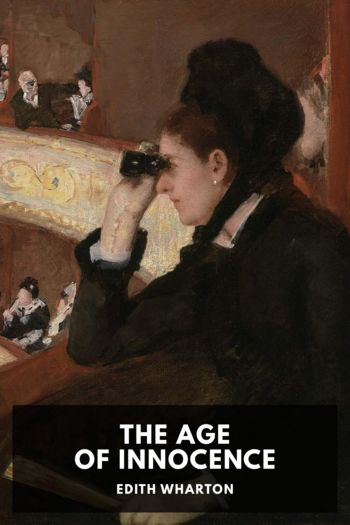The Age of Innocence, Edith Wharton [best 7 inch ereader txt] 📗

- Author: Edith Wharton
Book online «The Age of Innocence, Edith Wharton [best 7 inch ereader txt] 📗». Author Edith Wharton
Archer had no heart to go on pleading with her; he was too much disappointed at the vanishing of the new being who had cast that one deep look at him from her transparent eyes. May seemed to be aware of his disappointment, but without knowing how to alleviate it; and they stood up and walked silently home.
XVII“Your cousin the Countess called on mother while you were away,” Janey Archer announced to her brother on the evening of his return.
The young man, who was dining alone with his mother and sister, glanced up in surprise and saw Mrs. Archer’s gaze demurely bent on her plate. Mrs. Archer did not regard her seclusion from the world as a reason for being forgotten by it; and Newland guessed that she was slightly annoyed that he should be surprised by Madame Olenska’s visit.
“She had on a black velvet polonaise with jet buttons, and a tiny green monkey muff; I never saw her so stylishly dressed,” Janey continued. “She came alone, early on Sunday afternoon; luckily the fire was lit in the drawing-room. She had one of those new card-cases. She said she wanted to know us because you’d been so good to her.”
Newland laughed. “Madame Olenska always takes that tone about her friends. She’s very happy at being among her own people again.”
“Yes, so she told us,” said Mrs. Archer. “I must say she seems thankful to be here.”
“I hope you liked her, mother.”
Mrs. Archer drew her lips together. “She certainly lays herself out to please, even when she is calling on an old lady.”
“Mother doesn’t think her simple,” Janey interjected, her eyes screwed upon her brother’s face.
“It’s just my old-fashioned feeling; dear May is my ideal,” said Mrs. Archer.
“Ah,” said her son, “they’re not alike.”
Archer had left St. Augustine charged with many messages for old Mrs. Mingott; and a day or two after his return to town he called on her.
The old lady received him with unusual warmth; she was grateful to him for persuading the Countess Olenska to give up the idea of a divorce; and when he told her that he had deserted the office without leave, and rushed down to St. Augustine simply because he wanted to see May, she gave an adipose chuckle and patted his knee with her puffball hand.
“Ah, ah—so you kicked over the traces, did you? And I suppose Augusta and Welland pulled long faces, and behaved as if the end of the world had come? But little May—she knew better, I’ll be bound?”
“I hoped she did; but after all she wouldn’t agree to what I’d gone down to ask for.”
“Wouldn’t she indeed? And what was that?”
“I wanted to get her to promise that we should be married in April. What’s the use of our wasting another year?”
Mrs. Manson Mingott screwed up her little mouth into a grimace of mimic prudery and twinkled at him through malicious lids. “ ‘Ask Mamma,’ I suppose—the usual story. Ah, these Mingotts—all alike! Born in a rut, and you can’t root ’em out of it. When I built this house you’d have thought I was moving to California! Nobody ever had built above Fortieth Street—no, says I, nor above the Battery either, before Christopher Columbus discovered America. No, no; not one of them wants to be different; they’re as scared of it as the smallpox. Ah, my dear Mr. Archer, I thank my stars I’m nothing but a vulgar Spicer; but there’s not one of my own children that takes after me but my little Ellen.” She broke off, still twinkling at him, and asked, with the casual irrelevance of old age: “Now, why in the world didn’t you marry my little Ellen?”
Archer laughed. “For one thing, she wasn’t there to be married.”
“No—to be sure; more’s the pity. And now it’s too late; her life is finished.” She spoke with the cold-blooded complacency of the aged throwing earth into the grave of young hopes. The young man’s heart grew chill, and he said hurriedly: “Can’t I persuade you to use your influence with the Wellands, Mrs. Mingott? I wasn’t made for long engagements.”
Old Catherine beamed on him approvingly. “No; I can see that. You’ve got a quick eye. When you were a little boy I’ve no doubt you liked to be helped first.” She threw back her head with a laugh that made her chins ripple like little waves. “Ah, here’s my Ellen now!” she exclaimed, as the portières parted behind her.
Madame Olenska came forward with a smile. Her face looked vivid and happy, and she held out her hand gaily to Archer while she stooped to her grandmother’s kiss.
“I was just saying to him, my dear: ‘Now, why didn’t you marry my little Ellen?’ ”
Madame Olenska looked at Archer, still smiling. “And what did he answer?”
“Oh, my darling, I leave you to find that out! He’s been down to Florida to see his sweetheart.”
“Yes, I know.” She still looked at him. “I went to see your mother, to ask where you’d gone. I sent a note that you never answered, and I was afraid you were ill.”
He muttered something about leaving unexpectedly, in a great hurry, and having intended to write to her from St. Augustine.
“And of course once you were there you never thought of me again!” She continued to beam on him with a gaiety that might have been a studied assumption of indifference.
“If she still needs me, she’s determined not to let me see it,” he thought, stung by her manner. He wanted to thank her for





Comments (0)